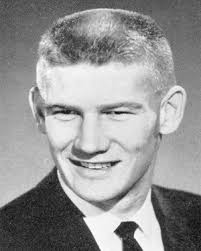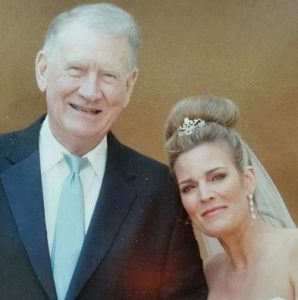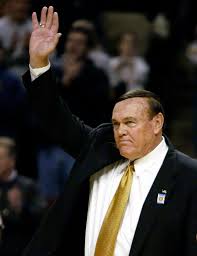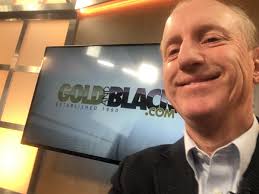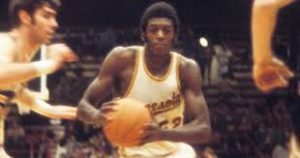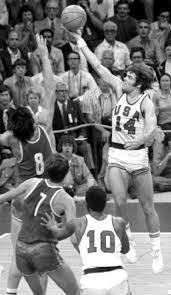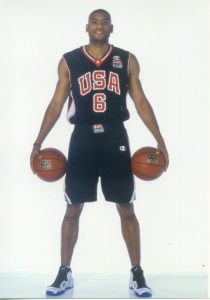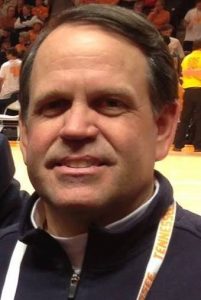The NBA Finals date back to 1947 (when they were known as the Basketball Association of America Finals) and the very 1st NCAA tourney was held in 1939. Olympic basketball competition is even older: it debuted as a demonstration event in 1904 and the men’s version became a medal sport in 1936, with the women finally getting their chance to go for the gold in 1976. The United States has dominated Olympic basketball competition from the start: the men have won 15 gold medals in the 18 tournaments they have participated in during the past 84 years, while the women have won 8 gold medals in the 10 tournaments in which they have competed during the past 44 years. Those of you who were looking forward to the 2020 Olympics opening ceremonies in Tokyo on July 24, 2020 will have to wait an extra 364 days, as the coronavirus caused a postponement until July 23, 2021. Due to the absence of college basketball since mid-March, HoopsHD’s Jon Teitel decided to fill the void by trying to interview as many prior Olympic players/coaches as possible so that you have something to read this summer while not watching the Summer Games. We continue our coverage by chatting with Diana Imhoff about her father Darrall winning an NCAA title in 1959 and a gold medal in 1960. Today marks the 3rd anniversary of Darrall’s passing in 2017 so we are proud to honor his memory.
Your father Darrall was born/raised in California: what made him choose Cal, and how did he feel about beginning his career as a walk-on? He was a forestry major and trained at altitude by playing volleyball, which led to his breakout season: it was unintentional conditioning. He once made a play on defense by pinning the ball against the glass in a game early in his junior season…and the entire crowd went silent because they had never seen anything like that. When his teammates saw that they realized that they might win it all that year. He went to Alhambra High School, where he is now part of their Hall of Fame. He was screwing around in the Alhambra locker room as a junior or senior when he slipped and broke his elbow. Stu Inman was the coach at Orange Coast JC: he asked the Alhambra coach about my dad and was told, “He will not amount to anything”. My grandmother’s sister Vivian was the chair of the Claremont McKenna humanities department and called Cal coach Pete Newell to see if he had any space available in his player dorms…and Pete said that he was not part of the housing office. Vivian then mentioned that her nephew was 6’8”, which gave him the opportunity to get to Cal, where the rowing coach tried to recruit him to his own team. Pete had given away all of the beds so during his 1st year my dad was stuck in a boarding house on a twin-size bed with an orange crate on the end of it. His roommate was Bob Steiner, who later worked as the SID at Cal and in PR for the Lakers, and Ned Averbuck was the benchwarmer who kept track of everything.
He played for Hall of Fame coach Pete Newell: what made Newell such a great coach, and what was the most important thing that your dad ever learned from him? His judgment on athletic ability/team unity was the best. He drilled the fundamentals, which is why he had 5 men on the floor who were all contributing by setting picks/rebounding at both ends of the floor/taking charges. All of his players benefited from that. My dad left Berkeley 3 credits shy of graduating and in his mid-50s he realized that he was the only guy who ever played for Pete who had not graduated. He took some correspondence classes, walked across the stage in his cap/gown, and got his degree. The team would gather for Pete’s birthday every year with their spouses/kids to celebrate him. My grandfather’s birthday was only a few days apart from Pete’s birthday. 1 year I heard Jerry West speak at the Rotary Club in LA about his new book. He mentioned that he had been driving to interview Pete for his book but missed a freeway exit and had to double back. When Jerry finally showed up he was told that Pete had just passed away a few minutes earlier: Jerry wept because he never got a chance to say goodbye to his old coach. I think about what a guru Jerry has become regarding the evaluation of talent in Memphis/Golden State/LA: he wants to go somewhere that he can really make a difference. Jerry needs affirmation about what he does, which is why he left Golden State after they became a dynasty. I am sure that Pete sowed some seeds into Jerry’s eye for talent. I heard John Wooden giving a keynote speech 1 time and gave my card to his assistant: Wooden ended up making room for me at his own table. He said that my dad/Pete kept UCLA out of the Final 4 for so many years and that he would not have had such a great career had Pete not eventually retired: what a humble thing to say!
Take me through the magical 1959 Final 4:
In the Final 4 against Cincinnati he had 22 PTS/16 REB in a 6-PT win: how was he able to get the best of future Olympic teammate Oscar Robertson (who had 19 PTS/19 REB/9 AST)? They walked out to the opening tip and 1 of my dad’s teammates introduced himself to Oscar as if he did not know who he was: I think it really rattled him because there was so much media hype at the time about Oscar. Whichever team has 5 men who will contribute will always win against a team that has 2 stars and 3 role players.
In the title game against West Virginia he scored 10 PTS including the go-ahead basket with 17 seconds left in a 1-PT win (future Olympic teammate West had 28 PTS/11 REB): what did it mean to him to win a title, and how did the family/team/school celebrate? Jerry said that both his best (winning a gold medal) and worst (this game) moments in basketball were a result of Pete Newell. At Pete’s funeral Jerry tore up his notes and spoke from his heart and wept about how Pete was more of a father to him than his own father was. The video I saw of the game showed that my dad tipped in a missed shot with 1 hand to give his team the lead. After my dad passed away his teammate Bill McClintock said that he knew the original shot was going to be off and Bill was going to make the winning basket and get his name in the newspaper headline…but my dad was just scrapping for the rebound. If you look at the photo of the celebration after the game his head is down: he was not basking in the glory but just playing for a coach who he loved. A great coach can get his players to play above their ability and achieve things that they could not ordinarily achieve on their own.
In the 1960 NCAA title game he scored 8 PTS in a loss to Ohio State (future Olympic teammate Jerry Lucas had 16 PTS/10 REB): what did it mean to him to lose the title game 1 year after winning the title game? I do not think that they took it as individual disappointment: they were just sad to not win another title for Pete. They did not have any delusions of grandeur but I am sure that they were a little disappointed even after the previous year’s triumph. They were a bunch of glass-half-full people so making it to the title game and then losing is not a black mark on your record.
That April he was drafted 3rd overall by the Knicks (behind Robertson/West): did he see that as a validation of his college career, or the realization of a lifelong dream of reaching the NBA, or other? They were all proven players as everyone saw from the Olympics. I think that his salary was comparable to a local schoolteacher’s salary where they lived in Long Island. The financial gain back then was not the same as it is now. I think getting drafted was sort of a surprise and he just figured he would go play pro basketball. It was not his master plan: it was just an option out of left field. He would get outdoors as much as possible during the off-season: he/Jerry would go hunting with Barron Hilton.
That fall he joined Robertson/West/Lucas on team USA at the 1960 Olympics: what did it mean to him to win a gold medal, and how did he feel when that team (featuring 10 future NBA players) was inducted into the Basketball Hall of Fame in 2010? Jerry and my dad became roommates on the road and eventually best friends. Jerry’s wife actually drove my mom to the hospital before she delivered me and the Wests are my sister’s godparents. My dad was a very patriotic person and confided in us many times that the most important moment of his basketball career was walking in the opening ceremony and carrying the USA flag. When he got his medal and heard the anthem on the podium it meant a great deal to him. He is on the cover of the Rome Olympic yearbook and if you look closely he is walking next to 13-year old swimmer Donna de Varona. I ran into Donna at the Beijing Olympics and she said that my dad and his whole team looked out for her in Rome. When the Vietnam War started he was too big to fit in a military vehicle but went over there as an entertainer with some other pro players to shore up the morale of the troops. He happened to be staying in the same hotel as John Wayne (who was filming “Hondo”) and they would hang out together and play cards. Wayne gave him a letter and asked him to mail it to his 2nd wife Pilar: I later told Pilar’s son Ethan about it! In 1964 Japan hired my dad and some of his Olympic teammates to come coach their players: he would have to duck under ceilings to avoid hitting his head.
On March 2, 1962, he faced the 76ers and had to guard Wilt Chamberlain: did he take it personally when Wilt ended up scoring an NBA-record 100 PTS? I heard my dad tell the story about that game many times. The Knicks had a few guys who were out with the flu (including their regular starting center) so my dad was thrust into the middle of everything. Wilt was basically cherry-picking because Philly wanted to go for the record that night during an exhibition game in Hershey. If you look at the box score my dad fouled out after only 20 minutes so Wilt did not score all of his 100 PTS against my dad. I have a photo on my wall of a game a few years later where my dad fouled Wilt as hard as he could: his feet are so high above Wilt’s feet because he needed his hops to get up into the clouds. There was no 3-second rule back then and Wilt was dunking from the FT line. The next night they played again in Madison Square Garden: my dad fouled out toward the end of the game while holding Wilt to “only” 50 PTS…and got a standing ovation as he walked to the bench!
After getting sold by Detroit to the Lakers after the 1964 season he made the NBA Finals 3 times in 4 years from 1965-1968: was it just a case of bad timing that he kept running into a Celtics dynasty that was in the middle of winning 10 titles in 11 years? Red Auerbach called him later in his career and asked him to join the Celtics. Lakers owner Jack Kent Cooke asked him if he would be willing to be traded to Philly and my dad said no way because his family was settled in LA. Cooke then told him that Philly would pay him twice as much and my dad said “When can we leave?!” My dad turned Red down because he could not stand the thought of wearing Celtic green: he hated them due to the Boston-LA rivalry. It was tough to lose to Boston every single spring. When my dad got to Philly after being traded for Wilt the fans were not sure how it would work out: the Philly players told some crazy road trip stories involving Wilt!
After retiring he became Vice President of Sales & Marketing at the United States Basketball Academy, an internationally-recognized basketball camp in Oregon: how did he get into the business, and how did he like it? My parents were in Portland and the USBA wanted to develop a grassroots basketball academy that fed into the Olympic team. The guys back then did not make enough to take summers off so he would go to Chico, CA, to help out with our family construction business. My dad built a lot of things at the basketball camp and loved his time there.
He passed away in 2017: when people look back at his career, how do you think that he should be remembered the most? He was the most humble person who deflected all of the credit onto the team. He was making sky-hooks/no-look passes before they even had a name. A lot of big men can dominate 1 end of the floor or the other but not both. He was all about the team and always included his teammates in his accolades because he considered them like family. He did a lot of speaking engagement for Christian organizations after retiring and joked that he always asked his mom why she did not wait 10 years for him to be born! His NBA pension was only $50,000: a lot of the older players and their widows all went on to have other jobs. He was regarded by his teammates as a really hard worker. Pete multiplied his work ethic: it was never about his own glory.

